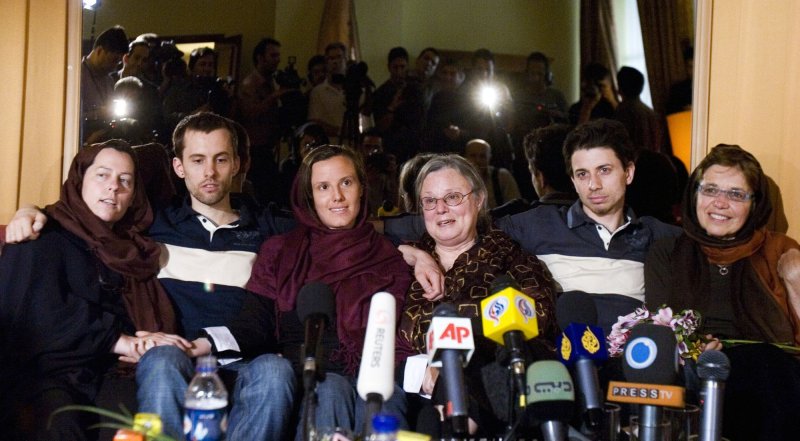Jailed Americans Shane Bauer (2nd-L), Sarah Shourd (3rd,L) and Josh Fattal (2nd,R) sit with their mothers Cindy Hickey (L), Nora Shourd (4th,L) and Laura Fattal (R) during a reunion at a hotel in northern Tehran, Iran on May 20, 2010. The mothers of the three jailed Americans arrived on Wednesday in Tehran and was received by the ambassador of the Swiss embassy,which represents the interests of the U.S. with Iran. UPI/Maryam Rahmanian |
License Photo
WASHINGTON, Sept. 23 (UPI) -- Experts say the two U.S. hikers who were released after 26 months in an Iranian prison will face enormous psychological challenges.
"What these two guys experienced over the past two years is an ongoing exposure to captivity, which is one of the most harmful and traumatic experiences that a human being can endure," said Yuval Neria, director of the Trauma and Post Traumatic Stress Disorder Program at the New York State Psychiatric Institute.
Shane Bauer and Josh Fattal, who were released to Oman Wednesday after being convicted in Iran on espionage charges, may experience post-traumatic stress disorder, anxiety, depression, severe psychotic breakdowns and reliving abuse, ABC News reported.
"Initially, there is great excitement, happiness and relief for them and their families, but studies have shown in numerous populations that the emotional impact can be quite severe," Neria said.
Sarah Shourd, who was released from Iran on a $500,000 bond in September 2010 for medical reasons, said she suffers from PTSD. The experience was so traumatizing she said she couldn't return to Iran to face her charges.
"There's a part of me that would like to be with them and be able to stand by them and defend our innocence in court, but I'm afraid that it would be too traumatic for me after what I've already been through," Shourd said.
Dr. T. Byram Karasu, psychiatrist-in-chief at Montefiore Medical Center in New York, said the three need to move on to the next phase of their lives.
"They need to define their next phase as quickly as possible and not allow themselves to be defined as prisoners of Iranian misjudgments. They may become more depressed if they don't reshape their lives."
Despite emotional challenges, experts say former prisoners can eventually recover from their experiences.
Dr. Paul Ragan, associate professor of psychiatry at Vanderbilt University School of Medicine in Nashville, said, "The human spirit is remarkably resilient."















